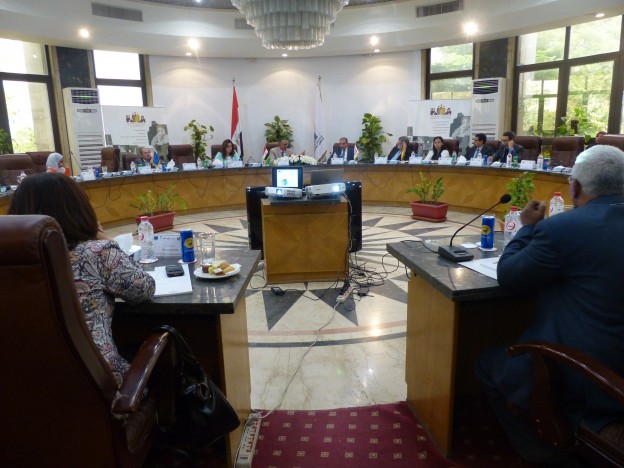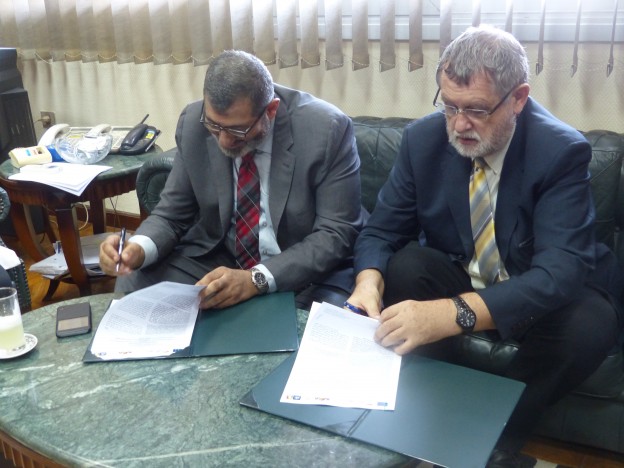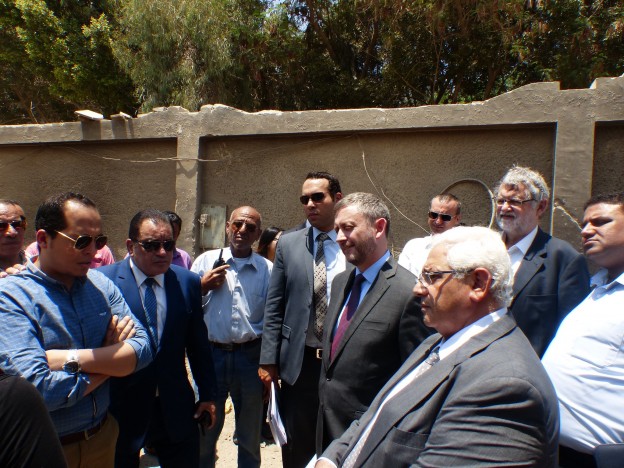D2- KHO1 & QAL1 & SEK1 & SEK2 priorinfo_en
A call for urban dialogue was initiated at the Sustainable Built Environment (SBE) Conference, held from 29 November to 1 December in Cairo. Mr. Sebastian Lesch, head of the German Cooperation in Egypt, Dr. Mostafa Madbouly, Minister of Housing, Utilities, and Urban Communities (MOHUUC), as well as representatives from the Deutsche Gesellschaft für Internationale Zusammenarbeit (GIZ), the European Union (EU) Delegation to Egypt, and UN Habitat, amongst others, were present at the opening.
In his address, Mr. Lesch intensified the call for participatory development in cities, particularly following the adoption of the New Urban Agenda at the Third United Nations Conference on Housing and Sustainable Urban Development (Habitat III), which was held in Quito, Ecuador this past October. He stressed on the centrality of cities to the drive towards “sustainable and climate-friendly ways of development” around the world. This, Mr. Lesch explained, can only be achieved through open dialogue, one in which local concerns are taken into account. He further commended joint efforts undertaken to implement the New Urban Agenda in Egypt.
During the conference, several Egyptian representatives renewed their commitment to the “principles of sustainable development” that ought to guide urban policy and development in the country. Minister Madbouly emphasized the importance of translating urban strategies into action, and situated his call for implementing urban policies during this dawning age of a “generation of new cities.” Plans for the new capital city were presented, as well as the government’s methods in dealing with informal settlements in Egypt. Among the government representatives present at the conference were Khaled Abbas, Undersecretary of the Minister of Housing, and Khaled Seddik, Executive Manager of the Informal Settlements Development Fund (ISDF).
Carl Philipp Schuck, Coordinator of Implementing the New Urban Agenda in Egypt (INUA) Project implemented by GIZ, capitalized on the significance of dialogue in implementing the New Urban Agenda in Egypt. In his address, Mr. Schuck called on all involved stakeholders to reflect collectively on the meaning of the Agenda for Egyptian cities, as well as to question some of the assumptions that often obstruct sustainable urban development.
Another theme that featured prominently in the conference was that of sustainable energy.
The conference marked the conclusion of the seven-year tenure of the EU-funded Energy Efficiency in the Construction Sector in the Mediterranean project (EU-MED-ENEC), also implemented by GIZ. In his speech, Diego Escalona Paturel, Head of Cooperation at the EU Delegation in Egypt, highlighted the importance of relying on efficient, renewable, and sustainable energy sources in Egypt and the world.
As a convention where academics, members of civil society, and government representatives openly discussed issues pertaining to sustainable urban development, the Sustainable Built Environment conference comes as a refreshing reminder for the meaning and importance of dialogue. Dialogue is a fundamental process in achieving sustainable urban development, as it relies on participation and fosters inclusivity. Set to continue until August 2017, the GIZ project for Implementing the New Urban Agenda in Egypt (INUA) strives to once again centralize and promote the role of inclusive dialogue in urban development.
The Qalyubeya Governorate, local partner of the Participatory Development Programme in Urban Areas (PDP) has been awarded a Guangzhou International Award for Urban Innovation at this year’s conference of the same name.
The awards ceremony was held in parallel to the conference in the Chinese City of Guangzhou from December 5-7, 2016. Qalyubeya has received the Urban Innovation Award for its achievements in the “Integrated Community-Based Solid Waste Management” project, which has been funded by the Federal Ministry for Economic Cooperation and Development (BMZ) as well as the Bill and Melinda Gates Foundation (BMGF) and implemented as part of the PDP from 2010 until 2014.
The prestigious award is put on by the City of Guangzhou as well as the United Cities and Local Governments (UCLG) and Metropolis organisations. The technical jury of the award, consisting of members of Cities Alliance, ICLREI, FLACMA as well as scholars from the University of Zaragoza, screened the 301 project contributions from around the world according to the criteria of innovation, effectiveness, replicability, and significance in order to identify 15 candidates (cities of excellence) to be invited to the awards ceremony in Guangzhou.
The award-winning project from Qalyubeya was based on an integrated approach, which included the following measures:
• Informal garbage collectors (zabaleen) were promoted in the start-up of businesses and began working as formal contractors of the District administrations.
• Motorized three-wheel vehicles were introduced in the community, thereby enabling the garbage collectors to penetrate narrow streets of informal settlements and to carry solid waste to the newly constructed transfer station, which has also been established by the project.
• The construction of a recycling centre helps to segregate the solid waste into recycling materials and green fuels for the cement industry.
• A local health centre was equipped with a new first aid station, which is primarily designed to serve the needs of the zabaleen community
The experience from this project is already being adapted by other cities in Egypt and some of the project’s principles have been integrated into the National Solid Waste Management Strategy. While only 10% of the local residents were satisfied with the garbage collection services prior to the project, a survey confirmed that more than 70% approved of the solid waste collection methods afterwards. The measure hence created a significant positive impact on the lives of the local population.
The laudatory speech of Mr. Augusto Mathias from the Brazilian Federation of Cities and Municipalities focused on the successful application of the integrated approach, which was able to consider the social component of development in an effective way. General Amr Abdel Moneim, the Governor of Qalyubeya, vowed to build on this success during his speech of thanks: “I promise that we will continue with this challenging work for the benefit of Qalyubeya and Egypt”.
The PDP is the currently largest urban development project of GIZ and receives funding from the BMZ, BMGF and a majority co-financing from the European Union. The Government of Egypt is also contributing to the success of PDP financially and in-kind.
With respect to the architectural measures incorporated in the climate change adaptation strategy of the Participatory Development Programme (PDP), the Cities and Climate Change component (C2) in partnership with The Research Institute for a Sustainable Environment (RISE) and Cairo Lab for Urban Studies, Training and Environmental Research (Cluster), has implemented a rooftop farm on one of the buildings in “Hassan Abdel Wahed” Street. It is hoped that this pilot project would act as a catalyst in spreading out the idea of rooftop farming in the area.
Architectural measures included plastering and painting of building façades in an informal settlement to contribute to its adaptive capacity towards intense climate conditions. A rooftop farm was also an important part of this project that aims to further yield environmental and socio-economic benefits to the residents. Having a strong socio-economic implication, contributing to income generation and reducing vulnerability to price hikes, rooftop farming greatly contributes to reducing temperatures through impacting the microclimate, while providing a recreational space for the local residents. Based on consultations with the building owner, the project partners designed and implemented the rooftop farm, planting eggplants, strawberries, cabbage, arugula, jasmine, mint, and rosemary.
Habitat III took place over the second week of October (17-20), with an active participation from the official Egyptian delegation along with representatives of civil society, academia, youth and private sector supported by the Deutsche Gesellschaft für Internationale Zusammenarbeit (GIZ) GmbH. The delegation attended and presented in a number of events that took place at the venue.
On the 20th of October 2016, the official Egyptian delegation along with other official delegates from all over the world, adopted the New Urban Agenda, committing to actively work on localizing and implementing the agenda nationally. The adopted agenda included a number of issues that face the Egyptian Urban Areas. Sustainable Urban Development, Urban Mobility, Poverty, Inequality, Environmental Degradation and Human Settlements Conditions were acknowledged with a vision that promotes the right to the city and cities for all, created through inclusiveness and participation. The principles of the agenda support the collaboration of a multi-disciplinary and sectoral approach focusing on the role of the different stakeholders while acknowledging the importance of finance. The agenda commits to participatory housing policies and equal affordable accessibility to basic physical and social infrastructure as well as land.
With Habitat III and the adoption of the New Urban Agenda in Quito 2016, GIZ has been commissioned by the German Federal Ministry for Economic Cooperation and Development (BMZ) to support the Implementation of the New Urban Agenda (INUA) in Egypt, facilitating a guided national follow up process succeeding the conference. The creation of an urban dialogue will be facilitated through the collaboration of different stakeholders representing national/local government, youth, academia, civil society and private sector, resulting in a final document called “Roadmap for Implementing the New Urban Agenda in Egypt.” The Roadmap is expected to be produced through an active urban dialogue between the relevant stakeholders.
The European Union (EU) Delegation to Egypt celebrated its Climate Action Day in Cairo in cooperation with the EU Member States Embassies. The event was attended by the delegation’s ambassadors, in addition to representative from the Egyptian Environmental Affairs Agency (EEAA) in Cairo, and representatives from companies and donors concerned with the climate change issue.
The event was dedicated to the fight against Climate Change. The European Union worldwide is organizing Climate Action Days in different shapes to raise awareness for what might be the most crucial struggle of this century. During the procedures, ambassadors of the EU Member States were handed over trees to be planted in Ahmed Badawy Preparatory School for Girls in Ezbet El Nasr area by the Coptic Evangelical Organization for Social Services (CEOSS) one of the Grant Beneficiaries of the Egyptian-German cooperation; the Participatory Development Programme in Urban Areas (PDP). Additional information of PDP’s activities related to Climate Change were disseminated to the participants at the event.
In his speech, Mr. Reinhold Brender, Chargé d’Affaires of the EU Delegation emphasized that the EU and its Member States are taking concrete implementation towards climate change adaptation very seriously. Climate action is an important priority for the EU in Egypt. The total value of currently ongoing as well as under preparation projects exceeds 700 million EUR in grants for the benefit of Egypt. The areas of focus are: renewable and clean energy, energy efficiency, water and waste management, pollution abatement, housing and agriculture and urban development.
A complementary event was held on Monday 24th of October, 2016 at Ahmed Badawy School where some students, teachers and representative from the education directorate on the district level planted the trees in the school garden.
Under the Grants scheme activities implemented by the Participatory Development Program in Urban Areas (PDP) and in line with the Direct Awards Grant Contract signed with Qalyubeya Governorate. PDP conducted a 10 days training workshop titled “Finance and Procurement Training Workshop” during the period from August 27th till September 6th 2016 at Egypt’s Public Library in Banha city. The training was attended by the Governorate’s top management, head of relevant departments such as accounting, financial control, contracting and procurement departments. The training addressed several important topics including budgeting, financial reports, internal control requirements, procurement procedures, governmental accounting and other essential topics designed to familiarize the targeted group with the EU / GIZ procedures and templates used in implementing the grant activities. At the end of the training workshop, the trainees have shown their content with the delivered training topics, material and the trainer’s efficiency.
It’s worth mentioning that this grant targets three areas in the Qalyubeya Governorate; Qalyub, El Khosoos and Shubra El Kheima.

The Seventh Steering Committee Meeting was held on September 21th, 2016 at the Informal Settlements Development Fund (ISDF)/ Ministry Of Housing, Utilities and Urban Communities (MOHUUC); around 30 different stakeholders participated in the meeting including MOHUUC, ISDF, Ministry of International Cooperation (MOIC), Ministry of Education (MOE), Ministry of Health (MOH), Qalyubeya, Cairo and Giza Governorates, the EU Delegation and the Participatory Development Programme/GIZ (PDP).
The purpose of this meeting was to inform the Steering Committee members about the main activities of the PDP/ EU Components, most notably the progress of the Grant Schemes including the First, Second and Third Call for Proposals, the Direct Award Grant Contracts signed with Cairo, Giza and Qalyubeya, in addition to the Institutional and Capacity Building activities. The meeting also aimed to present the steps ahead, particularly with regard to the EU Grant Scheme.

On Monday, September 5th, the Urban Training & Studies Institute (UTI), affiliated to the Housing and Building National Research Center (HBRC) of the Ministry of Housing Utilities and Urban Communities (MoHUUC), and the Participatory Development Programme in Urban Areas (PDP) signed an agreement of cooperation at the UTI premises. The agreement was signed by Mr. Khalid El Dahaby, Chief Executive Officer pf HBRC and Dr. Guenther Wehenpohl, Programme Coordinator of PDP.
It is worth mentioning that this cooperation agreement is a continuation of a previous agreement for year 2010-2011. The objective of the measure is to incorporate participatory methods within the UTI and using these tools in capacity development.

26 July 2016
Cairo — In the framework of the European Union’s (EU) Cooperation with Egypt, European and Egyptian officials visited ongoing developmental projects of the EU-funded Participatory Development Programme (PDP) in the urban area Ezbet El-Nasr. The PDP is implemented by the Deutsche Gesellschaft für Internationale Zusammenarbeit Gmbh (GIZ), on behalf of the German Federal Ministry for Economic Cooperation and Development (BMZ), in cooperation with the Ministry of Housing, Utilities, and Urban Communities (MOHUUC), and the three Governorates of the Greater Cairo Region (GCR).
The EU has allocated 40 million Euros and the German Government has contributed 8.5 million Euros for this project to improve the living conditions of the poor urban population in nine selected informal settlements in GCR (Cairo: Ain Shams, Ezbet El-Nasr, Matariya; Giza: Masaken Geziret El-Dahab; El-Warraq; Boulaq al Dakrour and Qalyubeya: Khosoos; Qalyoub and Shubra El-Kheima). Along with the implementation of small- and medium-sized infrastructure projects in cooperation with the three Governorates, the PDP supports the implementation of additional socio-economic projects through non-profit organisations and implements capacity development measures with the governorates and its districts.
The delegation first stopped at the Alwan Wa Awtar non-profit organisation. This organisation aims to provide a safe haven for children to nurture their artistic senses and intellectual abilities. As a committed partner to improve and develop urban areas, the organisation has received a grant to improve the education services for children of Ezbet El-Nasr. The delegation then visited the area on which a healthcare unit will be built with specialised clinics serving the Ezbet El-Nasr community. The construction will take place under the responsibility of the Cairo Governorate for a total budget of 630,000 Euros.
Mr. Michael Miller, Head of Unit for the Middle East at the European Commission, was accompanied by the Basateen District Chief Eng. Adel Abdel Zaher.